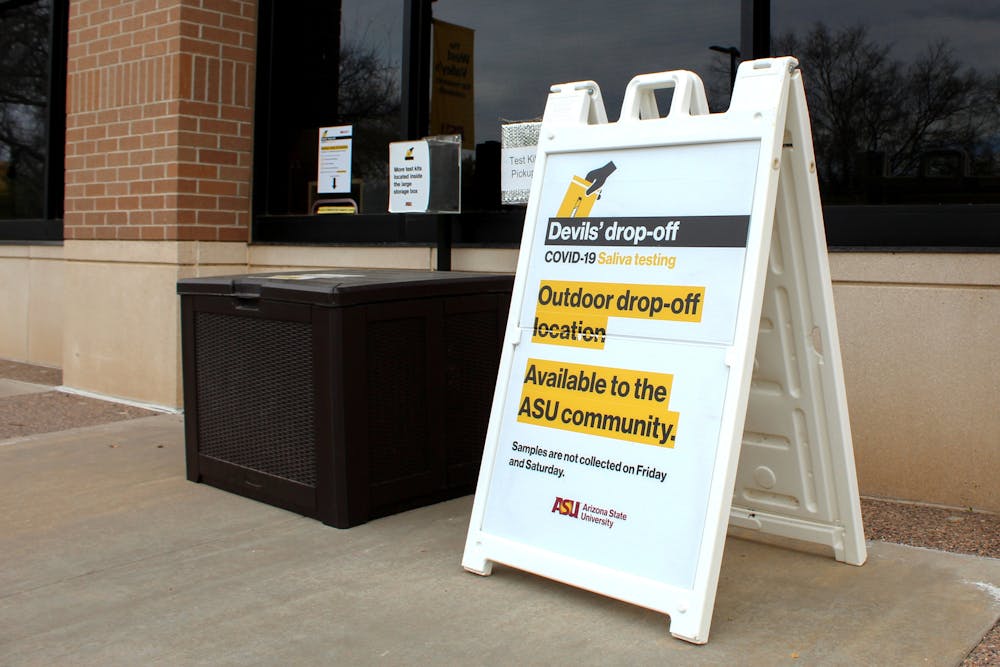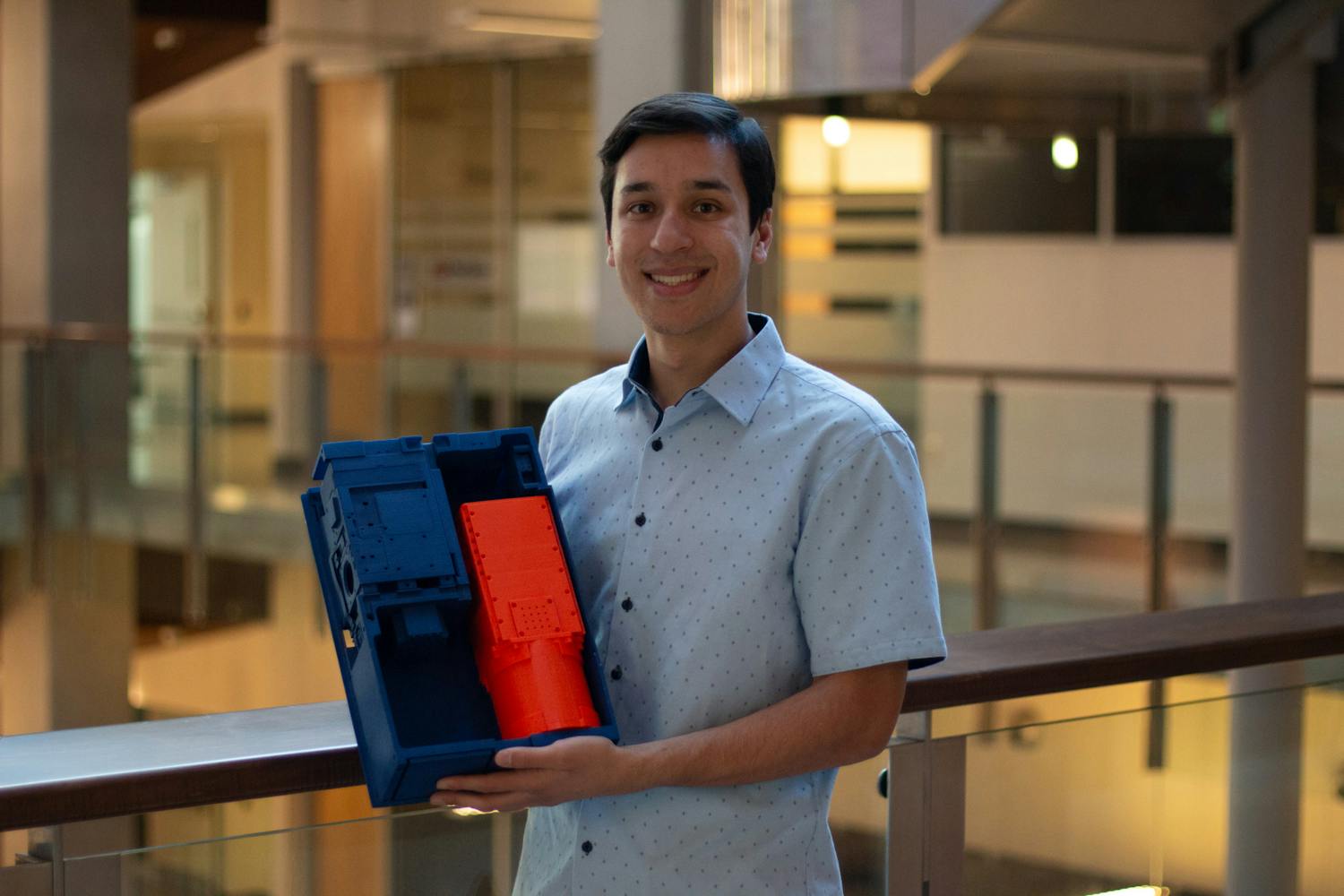While COVID-19 may not be at the forefront of every student's mind this year, ASU is quietly discussing the end of the Devils' drop-off program. This prospect could be devastating to the most vulnerable on campus, and students deserve access to free, accurate COVID tests.
Since May 2020, ASU has offered saliva PCR tests on all campuses through the Devils’ drop-off program. The clinical testing laboratory within the Biodesign Institute offers highly accurate COVID tests, with results delivered within 48 hours.
However, in May 2023, the program removed many of its drop-off sites. There are now only three drop-off locations on the Tempe campus and one location each for the West Valley, Downtown and Polytechnic campuses. The remaining locations are primarily in high-traffic and high-visibility locations, with none remaining in residence halls.
"The demand is reduced," Vel Murugan, an associate research professor at the Biodesign Institute and technical director of the clinical lab, said. "We started seeing (that) in many locations, we didn't even have any samples for days. It's just a demand to reduce it so that we can operate more efficiently."
However, there is a genuine possibility that the Devils' drop-off program may be eliminated altogether.
Carolyn Compton is the medical director of the clinical testing lab. In an email, she discussed the current and future status of the lab.
"We no longer have that source of funding, and demand for COVID testing has dropped," Compton said in her email. "For both reasons, we have had to close down many of our Devils' Drop-Off sample collection sites. Further, the future of the lab is somewhat uncertain."
The source of funding Compton is referring to is the state. Joshua LaBaer, the executive director of the Biodesign Institute and scientific director of the lab, said that the state was paying for many of the tests being run.
"If there were enough people using it, then I think the University might (still) do it," LaBaer said. "A big difference, of course, was back then, the state paid us to do those tests."
The financial burden of the clinical lab is not insignificant, nor is the labor that goes into running a clinical laboratory, which has to meet strict standards of accreditation. Tests must also be transported across the campuses to the clinical lab in the Biodesign Institute, although now there is no test pick-up offered on Friday or Saturday.
At the height of the pandemic, the lab required daily upkeep to meet the demand.
"We set up that lab," LaBaer said. "We got a bunch of new robots. We got all kinds of new automation, and we were meeting seven days a week, every day at 8:00 a.m."
This work paid off through keeping the community safe and providing valuable data to the state. In October 2021, the clinical lab completed its 1 millionth test.
It should also be acknowledged that COVID is not a pressing concern for many students, especially with better medical technology to combat the virus, such as vaccines, Paxlovid and rapid response tests. In fact, one reason the demand for Devils' drop-off may have been reduced is the prevalence of rapid response tests.
"A big thing that affected us was people getting the protein tests that they can get at the pharmacy," LaBaer said. "That test is very fast. It's not quite as accurate as our tests (and) doesn't get reported to the state like our test does, which is useful because the state can then track how often it's happening."
CVS offers rapid-response COVID tests from $10 to $20 with delivery options available. The federal government also offered four free rapid test kits per household in November.
However, rapid kits are less reliable than PCR kits, with a higher rate of false negatives.
This is why having free, highly reliable kits was such a boon to the community at the height of the pandemic. But even now, there are many reasons a community member needs either a free test or a more reliable one.
At this massive school, there are students facing financial difficulties and community members who are immunocompromised or who live with immunocompromised people. People may also prefer a more accurate test to guide their decision-making, like when they return to classes or a job after testing positive.
A free test in an easily accessible location may also increase the chance that students will test at the first sign of illness. The barriers to the test include cost, distance and even the fear of missing class or work. These hinderances may keep students from testing at the first sign of illness, which puts the most vulnerable members of the community at risk.
Every student may not appreciate the Devils' drop-off program, but for those who need it, the program is invaluable.
It should also be noted that the leadership of the clinical lab is not necessarily the ones advocating for the end of the lab. They were also unable to say what the program's future will be, as it is still under discussion.
"We are trying really hard to keep an active clinical testing lab within ASU moving forward," Murugan said.
ASU should remember the full value of Devils' drop-off as it decides the future of the clinical testing lab, and community members who value access to these free tests should take advantage while they still can.
Edited by Walker Smith, Sadie Buggle and Grace Copperthite.
Reach the reporter at syramir2@asu.edu and follow @nerdyoso on X.
Like The State Press on Facebook and follow @statepress on X.
Editor's note: The opinions presented in this column are the author's and do not imply any endorsement from The State Press or its editors.
Want to join the conversation? Send an email to editor.statepress@gmail.com. Keep letters under 500 words, and include your university affiliation. Anonymity will not be granted.
Sophia is a senior studying biological sciences. This is her fifth semester with The State Press. She has also worked as a science and technology reporter.




